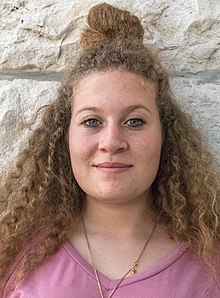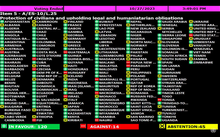2023 Gaza war ceasefire
[1][2][3] On 27 November, Qatari Ministry of Foreign Affairs announced a two-day extension to the ceasefire was agreed in which 20 Israelis and 60 Palestinians would be released.[11][12][13] By 2 December negotiations had broken down, with the Israeli delegation leaving Qatar following an impasse and Hamas announcing they will not release any more hostages until the end of the war.[29][32][33] Many of these prisoners are held under administrative detention, a process which is criticized by human right organizations as it only applied to West Bank Palestinians, and were arrested for crimes such as speech and nonviolent protest.[38][39] On 24 October, US President Joe Biden stated, "We should have those hostages released and then we can talk",[40] and has subsequently doubled down on that opposition, saying that doing so would allow Hamas to attack Israel again.[51] On 11 October, Brazilian President Luiz Inácio Lula da Silva called for a ceasefire, stating, it was "urgently needed in defense of Israeli and Palestinian children".[72][73] On 9 December the prime ministers of Spain, Ireland, Belgium, and Malta signed a joint letter urging the European Union to call for a permanent ceasefire.[74] On 19 October, Cuban Foreign Affairs Minister Bruno Rodriguez Parrilla called for a ceasefire, stating the war was the result of the "violation of the inalienable rights of the Palestinian people".[90] On 26 November, EU Commissioner for Cohesion and Reforms, Elisa Ferreira, speaking on behalf of Josep Borrell, stated the European Union was calling for an immediate ceasefire.[101] In response, Hamas declined this offer on 20 December, asserting that the release of Israeli hostages would not be considered until a ceasefire was put into place first.[105] The deal provided for a four-day pause in fighting, the release of 50 Israeli hostages and 150 Palestinian prisoners, and the entry of more humanitarian aid into Gaza.[105] The Israeli government said that the ceasefire would be extended by one day for every additional 10 hostages released by Hamas,[112][113] but insisted that fighting would resume once the truce is over.[116] But a term of the agreement was that Red Cross officials would be able to visit the hostages still held captive in Gaza by the end of the fourth day of the ceasefire.The Gaza Health Ministry said that two people were killed and about thirty injured after Israeli soldiers had opened fire on Palestinians in the early morning.[124] Sky News reported on 24 November that Israeli sniper fire injured members of a group of civilians trying to cross from the North to the South of Gaza on the first day of the ceasefire.This decision is a violation of the truce agreement between Israel and Hamas that stipulated Red Cross officials would be able to visit the hostages still held captive in Gaza by the end of the fourth day of the ceasefire.[149] Relatives of an American-Israeli girl who was orphaned in the 7 October attacks celebrated her release stating, "there are no words to express our relief and gratitude" on her homecoming."[153] In the Qalandiya refugee camp in the West Bank, a Palestinian stated that while the cease fire is a good pause from the bombardment it is not a solution, calling the Israeli military actions a massacre.[156] During the ceasefire, U.S. secretary of state Antony Blinken said that any future military operation by Israel should include plans to minimize further casualties of Palestinian civilians.[9] On 22 November, South African President Cyril Ramaphosa welcomed the four-day ceasefire and expressed hope that it would bolster efforts to achieve an "outright end to the current conflict."[158] On 30 November, Spanish Prime Minister Pedro Sanchez stated that continuing the military actions in Gaza after the truce ends is not acceptable, and that he doubts Israel respects the international humanitarian law.[160] On 22 December, Scottish Prime Minister Humza Yousaf stated, "When history books tell the story of the devastation of Gaza, future generations will rightly condemn those who opposed an immediate ceasefire."[161] White House National Security Council spokesman John Kirby has attributed the end of the temporary cease-fire agreement with Israel to Hamas.[162][163][15][164][16] On December 2, Netanyahu ordered the return of the delegation from Doha, as negotiations reportedly had stalled due to Hamas's refusal to implement agreements that provided for the release of all children and women from a list of hostages.[165] The same day, after the truce had already ended, Turkey's president Recep Tayyip Erdoğan stated that the opportunity for a permanent ceasefire was lost due to what he refers to as "Israel's uncompromising approach".


Gaza warTimelineOutlineOctober 7 Hamas-led attack on IsraelMilitary engagementsSderotNahal OzOfakimNova music festival massacreNetiv HaAsaraAlumimBe'eriKfar AzaKissufimNir OzNir YitzhakIsraeli invasion of the Gaza StripBeit HanounGaza CityJabalia IKhan YunisAl-QararaShuja'iyya IShuja'iyya ambushShuja'iyya IIInsurgency in the North Gaza StripKhan Yunis IIKhan Yunis IIINorth GazaIsraeli incursionsTulkarm IOperation Summer CampsTulkarm IIBattle of NetzarimGaza genocideIsraeli bombing of the Gaza StripRefugee campsJabalia31 OctoberAl-Fakhoora schoolAl-Shati refugee campAl-MaghaziSchoolsPalestinians evacuating GazaHealth facilitiesAl-Ahli Arab HospitalAl-Shifa HospitalAmbulanceNasser HospitalAttacks on religious sitesRafah strikesFlour massacreKuwait RoundaboutAttack on journalists in LebanonFriendly fireIDF killing of hostages in Shuja'iyyaTel al-SultanAl-Mawasi (May)Al-Sardi schoolNuseiratAl-Mawasi (June)Al-Shati and Tuffah9 July 2024 attacksAl-Awda schoolAl-Mawasi (July)Al-Shati (July)Khan Yunis (July)Khadija schoolHamama schoolAl-Tabaeen schoolDeir al-BalahAl-Mawasi (September)Al-Jawni schoolTulkarm CampDeir al-Balah mosqueRufaida schoolAl-Aqsa hospitalKilling of Shaban al-DalouAbu Hussein schoolBeit Lahia (19 October)Beit Lahia (29 October)Kerem Shalom aid convoy lootingAl-Mawasi (December)Nuseirat (December)War crimes and effectsHamas war crimesHostage crisisPrisoner exchangeIsraeli war crimesIsraeli blockade of GazaFamineAI-assisted targetingMass detentionsSouth Africa v. IsraelICC arrest warrantsGaza Strip mass gravesTortureExecutions and assassinationsKilling of journalistsList of journalistsGaza humanitarian crisisChildrenHealthcare collapsePremature babiesImpacts and repercussionsDiplomatic impact2025 ceasefireCalls for a ceasefireEconomic impactOther theatersRed Sea crisisOperation Prosperity GuardianAttacks on the MV Maersk HangzhouOperation Poseidon ArcherMarlin Luanda missile strikeOperation AspidesSinking of the MV RubymarAttacks on the MV Tutor2024 Houthi drone attack on Israel20 July 2024 Israeli attack on YemenAttacks on the Sounion29 September 2024 Israeli attacks on YemenAttacks on U.S. bases in Iraq, Syria, and JordanIranian airstrikes in Iraq and SyriaTower 22 drone attackFebruary 2024 United States airstrikes in Iraq and Syria